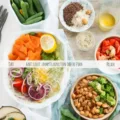Understanding Inflammation and Its Impact on Your Health
Inflammation is your body’s natural response to injury and infection, but when it becomes chronic, it can lead to a host of health issues. The good news is that with the right approach, you can outsmart inflammation and support your body’s natural healing processes. This comprehensive plan will guide you through lifestyle changes and natural remedies to reduce inflammation and enhance your overall wellbeing.
The Mind-Body Connection: Reducing Stress to Combat Inflammation
Stress is a significant contributor to chronic inflammation. By addressing your mental and emotional wellbeing, you can make a big impact on your physical health:
- Practice mindfulness meditation or deep breathing exercises daily
- Engage in gentle yoga or tai chi to promote relaxation
- Prioritize quality sleep, aiming for 7-9 hours per night
- Nurture supportive relationships and practice gratitude
Remember, self-compassion is key. Be gentle with yourself as you implement these changes, understanding that healing is a journey, not a destination.
Nourishing Your Body with Anti-Inflammatory Foods
The foods you eat can either fuel inflammation or help combat it. Focus on incorporating these anti-inflammatory powerhouses into your diet:
- Colorful fruits and vegetables, rich in antioxidants
- Omega-3 fatty acids found in fatty fish, flaxseeds, and walnuts
- Herbs and spices like turmeric, ginger, and garlic
- Green tea and other antioxidant-rich beverages
Approach your diet with joy and curiosity, exploring new recipes and flavors that nourish both your body and soul.
The Healing Power of Movement
Regular physical activity is a potent anti-inflammatory tool. Find activities you enjoy and make them a consistent part of your routine:
- Low-impact exercises like swimming or cycling
- Strength training to build muscle and support joint health
- Walking in nature to reduce stress and boost mood
- Stretching or foam rolling to improve flexibility and circulation
Listen to your body and choose activities that feel good. Movement should be a celebration of what your body can do, not a punishment.
Natural Remedies and Supplements to Support Your Journey
While a healthy lifestyle forms the foundation of an anti-inflammatory approach, certain natural remedies can provide additional support:
- Omega-3 supplements if you don’t eat enough fatty fish
- Curcumin, the active compound in turmeric, known for its potent anti-inflammatory effects
- Probiotics to support gut health and reduce systemic inflammation
- Vitamin D, especially if you have limited sun exposure
Always consult with a healthcare professional before starting any new supplement regimen. Remember, these are supports, not substitutes for a healthy lifestyle.
Creating a Supportive Environment for Healing
Your environment plays a crucial role in your health and wellbeing. Consider these strategies to create a space that supports your anti-inflammatory journey:
- Reduce exposure to environmental toxins by using natural cleaning products
- Incorporate air-purifying plants into your living space
- Create a relaxing bedtime routine to improve sleep quality
- Surround yourself with positive, supportive people who encourage your health goals
Remember that small changes can make a big difference. Approach these adjustments with patience and kindness towards yourself.
Frequently Asked Questions
Q: How long does it take to see results from an anti-inflammatory lifestyle?
A: Everyone’s journey is unique, but many people report feeling improvements within a few weeks of consistently following an anti-inflammatory lifestyle. However, deeper healing can take months or even years. Be patient and celebrate small victories along the way.
Q: Can stress really cause inflammation in the body?
A: Yes, chronic stress can trigger and perpetuate inflammation in the body. When you’re stressed, your body releases inflammatory chemicals. Managing stress through relaxation techniques, exercise, and self-care is crucial for reducing inflammation.
Q: Are there any foods I should avoid to reduce inflammation?
A: While it’s best to focus on what to include rather than exclude, reducing your intake of processed foods, refined sugars, and trans fats can help lower inflammation. Listen to your body and notice how different foods make you feel.
Q: Is it necessary to take supplements to reduce inflammation?
A: While a healthy diet and lifestyle are the foundations of an anti-inflammatory approach, some people may benefit from targeted supplementation. Always consult with a healthcare provider to determine what’s right for you.
Q: Can exercise make inflammation worse?
A: While intense exercise can temporarily increase inflammation, regular moderate exercise actually helps reduce chronic inflammation. The key is finding the right balance and listening to your body. Start gently and gradually increase intensity as your body adapts.
Embarking on an anti-inflammatory journey is an act of self-love and compassion. By making mindful choices in your diet, lifestyle, and mental outlook, you’re not just fighting inflammation – you’re nurturing your overall wellbeing. Remember, this is not about perfection, but about progress. Celebrate each step forward, be patient with setbacks, and trust in your body’s innate wisdom and healing abilities. With consistency and self-compassion, you can outsmart inflammation and cultivate a deeper sense of health and vitality.









